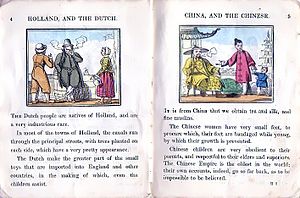Ethnic stereotype

An ethnic stereotype (national stereotype, or national character) or racial stereotype involves part of a system of beliefs about typical characteristics of members of a given ethnic group or nationality, their status, societal and cultural norms.
National stereotypes may relate either to one's own ethnicity/nationality or to a foreign or differing nationality or ethnicity. Stereotypes about one's own nation may aid in maintaining a national identity due to a collective relatability to a trait or characteristic.[1]
Examples[]
According to an article by The Guardian titled "European Stereotypes: What Do We Think of Each Other and Are We Right?", the Europe stereotype towards Britain is as "drunken, semi-clad hooligans or else snobbish, stiff free marketers", their view towards France is "cowardly, arrogant, chauvinistic, erotomaniacs", and they see Germany as "uber-efficient, diligent [and] disciplined". To Europe, Italy is "tax-dodging, Berlusconi-style Latin lovers and mama's boys, incapable of bravery", Poland is "heavy-drinking ultracatholics with a whiff of antisemitism", and Spain is "macho men and fiery women prone to regular siestas and fiestas". While some countries such as Germany proudly own their stereotype, others like Spain argue that theirs is a warped view based on experiences while on holiday instead of having actually lived there.[2]
A Pew Global survey of the European countries United Kingdom, France, Germany, Spain, Italy, Greece, Poland, and Czechia found that European stereotypes found Germany to be both the most hardworking and least corrupt, Greece to be the least hardworking, and Italy to be the most corrupt. Five out of the eight countries thought their own country was the most corrupt.[3]
has designed many maps which serve as pictorial representations of such stereotypes, giving an impression of how certain regions of the world may view others.[4][5][6] They have named such as "The Arab Winter" and "Crystal Ball View Of Europe In 2022".[7]
See articles in category:Ethnic and racial stereotypes for more specific and detailed discussions.
Validity of stereotypes[]
It is sometimes held that such stereotypes often contain a grain of truth.[8][9] However an extensive study by personality psychologist Robert R. McCrae of the National Institute on Aging and colleagues found that in general they are not trustworthy.[10][9]
Various anti-national phobias and prejudices operate with ethnic stereotypes.
Ethnic stereotypes are commonly portrayed in ethnic jokes, some of which some consider to be offensive to varying degrees. Richard M. Steers and Luciara Nardon in their book about global economy use the "You have two cows" joke to illustrate the concept of cultural differences. They write that jokes of this kind:[11]
- Russian company: You have two cows. You drink some vodka and count them again. You have five cows. The Russian Mafia shows up and takes however many cows you have.
- Californian company: You have a million cows. Most of them are illegals.
– are considered funny because they are realistic caricatures of various cultures, and the pervasiveness of such jokes stems from the significant cultural differences. Steers and Nardon also state that others believe that cultural stereotypes in jokes of this kind must be viewed with caution.[11]
See also[]
- Mores
- National character studies
- National personification
- Objectification of people
- Racial profiling
- Racial stereotyping in advertising
- Racism
- Stereotypes about indigenous peoples of North America
- Stereotypes of Americans
- Stereotypes of Argentines
- Stereotypes of Jews
- Stereotypes of South Asians
- An Englishman, an Irishman and a Scotsman joke
References[]
- ^ Terracciano A, Abdel-Khalek AM, Adám N, et al. (October 2005). "National character does not reflect mean personality trait levels in 49 cultures". Science. 310 (5745): 96–100. Bibcode:2005Sci...310...96T. doi:10.1126/science.1117199. PMC 2775052. PMID 16210536.
- ^ "European stereotypes: what do we think of each other and are we right? - interactive | World news". theguardian.com. January 26, 2012. Retrieved October 14, 2013.
- ^ Graphic detail Charts, maps and infographics (May 30, 2012). "Greeks say they are the hardest-working European nation: Stereotypes of Europe". The Economist. Retrieved October 14, 2013.
- ^ "MAPS: A Complete Guide To National Stereotypes All Around The World | Business Insider Australia". Businessinsider.com.au. September 3, 2011. Retrieved October 14, 2013.
- ^ "Yanko Tsvetkov's stereotype maps - in pictures | Art and design". The Guardian. February 17, 2012. Retrieved October 14, 2013.
- ^ "Mapping Stereotypes". Alphadesigner. Retrieved October 14, 2013.
- ^ Tim Dowling. "Stereotype maps: Is that what they think of us? | Art and design". The Guardian. Retrieved October 14, 2013.
- ^ "Why do people find racist jokes funny?". BBC News. May 7, 2002. Retrieved January 22, 2009.
- ^ a b "The Inaccuracy of National Character Stereotypes", J Res Pers. 2013 Dec 1; 47(6), doi:10.1016/j.jrp.2013.08.006
- ^ "Science gets the last laugh on ethnic jokes". MSNBC. (2005)
- ^ a b Managing In The Global Economy, by Richard M. Steers, Luciara Nardon (2005) ISBN 0-7656-1551-7
Further reading[]
- Alí, Maurizio. (2010). Medios de comunicación, asuntos étnicos e intercultura en Colombia. En Revista Razón y Palabra, 74 (nov.2010/ene.2011). México DF: ITESM Campus Estado de México. ISSN 1605-4806.
- Macrae CN, Stangor C, Hewstone M.(eds.) "Stereotypes and stereotyping." Guilford Press, 1996.
- Pawel Milicki, Naomi Ellemers, Being different or being better?, European Journal on Social Psychology, vol. 26, 1996, pp.97-114
- National Stereotypes and Product Evaluations in a Socialist Country (journal article)
- Ethnic and National Stereotypes: The Princeton Trilogy Revisited and Revised (journal article)
- National Stereotypes: Correct Images and Distorted Images, ed. Blanca Valota, 2007, ISBN 8876949534
- National Stereotypes: an Educational Challenge (book)
- Haiti and the United States: National Stereotypes and the Literary Imagination (book)
- Ethnic and racial stereotypes
- National identity
- Race and society
- Racism